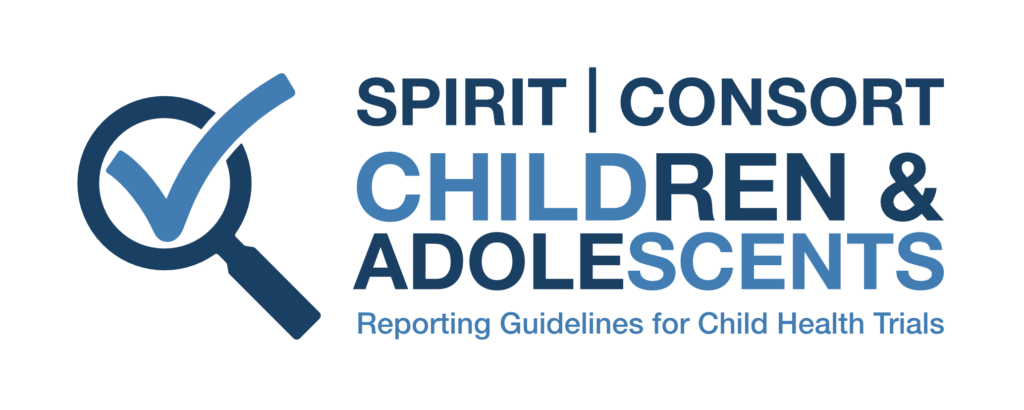Research reporting guidelines, such as SPIRIT (Standard Protocol Items for Randomized Trials) and CONSORT (Consolidated Standards of Reporting Trials) guidelines offers a standard way for authors to prepare protocols and reports for randomized controlled trials. These guidelines facilitate complete and transparent reporting, which in turn aids their critical appraisal and interpretation. Over the years, SPIRIT and CONSORT have led to improved reporting and better implementation of trials; however, specific elements for trials with children (from newborn babies to adolescents, detailing the intervention, drug dose and delivery, validity of the outcomes studied, etc.) are not included. Growing evidence suggests the need for additional and modified items specific to child health that factor in these unique considerations to improve reporting in child health randomized controlled trials and reduce research waste.
In collaboration with members of the SPIRIT and CONSORT Group, we are extending the current SPIRIT and CONSORT statements and are developing a checklist of essential reporting items that authors should include when writing child health randomized controlled trial protocols and reports. These new guidelines will be called SPIRIT-Children and Adolescents (SPIRIT-C) and CONSORT-Children and Adolescents (CONSORT-C). SPIRIT | CONSORT-C will comprise of reporting items that cover various key elements associated with child health trials that differ from adult trials. The development will involve the evaluation of current evidence from published guidelines and implementing expert, consumer, and knowledge user feedback to produce a checklist and supplementary Explanation and Elaboration (E&E) document.
This project seeks to (a) obtain consensus regarding the minimum items to be reported in child health randomized controlled trial protocols and reports, (b) develop a plan of research to develop guidelines for researchers on how to implement checklist items, and (c) plan a knowledge translation strategy to disseminate the SPIRIT | CONSORT-C guidelines and to ensure endorsement. By standardizing how researchers conduct trials in children, the SPIRIT | CONSORT-C guidelines may improve the safety, use and impact of clinical research.
View registrations on the Enhancing the Quality and Transparency of Health Research (EQUATOR) website:
The results of two systematic reviews highlighting the need for SPIRIT | CONSORT-C was published in Trials.
A Youth Advisory Group and Family Caregiver Advisory Group was formed in 2023. A Viewpoint was published in JAMA Pediatrics. The study protocol was published open access in Trials. From December 2023 to January 2024, a series of two Young Person Reporting Guideline Workshops were conducted virtually in Canada, England, France, Scotland, and Spain, which were attended by a total of 42 youth.
A three-round, international Delphi study was conducted from January – May 2024, which was followed by an international Consensus Meeting held virtually in June 2024. Pilot testing is now complete.
The Statement papers and Explanation and Elaboration (E&E) documents have been produced and are now being submitted. The guidelines will be published open access.
Systematic review: Clyburne-Sherin AV, Thurairajah P, Kapadia MZ, Sampson M, Chan WW, Offringa M. Recommendations and evidence for reporting items in pediatric clinical trial protocols and reports: two systematic reviews. Trials. 2015 Sep 18;16:417. doi: 10.1186/s13063-015-0954-0. PMID: 26385379; PMCID: PMC4574457.
Viewpoint: Baba A, Offringa M. Transparent Reporting-SPIRIT-C/CONSORT-C Pediatric Updates. JAMA Pediatr. 2023 Dec 26. doi: 10.1001/jamapediatrics.2023.5740. Epub ahead of print. PMID: 38147343.
Protocol: Baba A, Smith M, Potter BK, Chan AW, Moher D, Offringa M. Guidelines for reporting pediatric and child health clinical trial protocols and reports: study protocol for SPIRIT-Children and CONSORT-Children. Trials. 2024 Jan 30;25(1):96. doi: 10.1186/s13063-024-07948-7. PMID: 38287439.
We have prepared four papers, which are now being submitted:
- Enhancing the reporting quality and usefulness of paediatric randomized controlled trial protocols: SPIRIT-Children and Adolescents 2025 Extension (SPIRIT-C) guidance
- SPIRIT-C Explanation and Elaboration: Recommendations for enhancing the reporting quality and usefulness of paediatric randomized controlled trials protocols
- Enhancing the reporting quality and impact of paediatric randomised controlled trials: CONSORT-Children and Adolescents 2025 Extension (CONSORT-C) guidance
- CONSORT-C Explanation and Elaboration: Recommendations for enhancing the reporting quality and impact of paediatric randomised controlled trials
Coming soon!
Coming soon!
Coming soon!
Coming soon!
Coming soon!
Coming soon!
This project is funded by Canadian Institutes of Health Research (CIHR).
Logo designed by Matthew Prebeg
Updated March 2025


